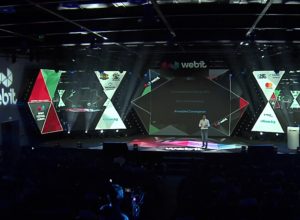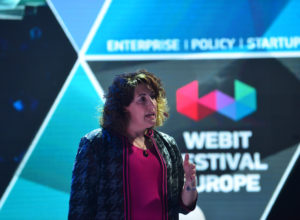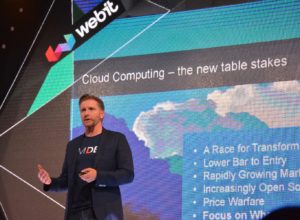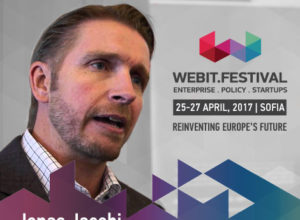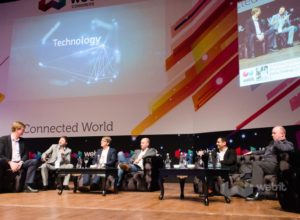Tag: IBM
The symbiosis between humans and machines is our best hope for...
“We now use AI in situations where we didn’t have any solution yet - where technology is not capable of achieving specific results. We are putting a lot of efforts, time and resources to get there. What we have proved already is that we can solve complex, but narrow problems”, he said.The first demonstration of a machine that was capable of solving a complex problem was in 1997 when IBM’s Deep Blue defeated Garry Kasparov in chess. Roughly 15 years later a team in IBM Research had the goal to understand natural human language. The public demonstration was to defeat a human at the show Jeopardy and this was accomplished. Another thing that happened last year was Alpha Go from Google DeepMind defeating Lee Sedol in the boardgame Go and also succeeding to solve a very complex problem in a very narrow domain. And just recently a team from Carnegie Mellon University succeeded in developing a smart machine that has defeated world class poker players in Texas Hold ‘Em because it can already understand and deal with incomplete information. This all means that the future goes into the direction where AI will be used for negotiation processes, strategy development and even high level policy analytics.
“When you go to your car dealer in the future you may have a small application on your device that helps you negotiate the best possible deal”, Auer-Welsbach said.The biggest issue before the AI today is understanding humans and language. The machines understand natural text as data, not as text. This is a problem, because they are missing the context, which is necessary in order to really make use of all the data. In a recent attempt IBM broke industry record in conversation speech recognition by getting it down to 5.5%. This is important because the human error is at 5.1% which means that we are very close to understanding the natural human language from a machine perspective. This new ability can be used to build transformative relationships between humans and machines. [caption id="attachment_5072" align="aligncenter" width="640"]
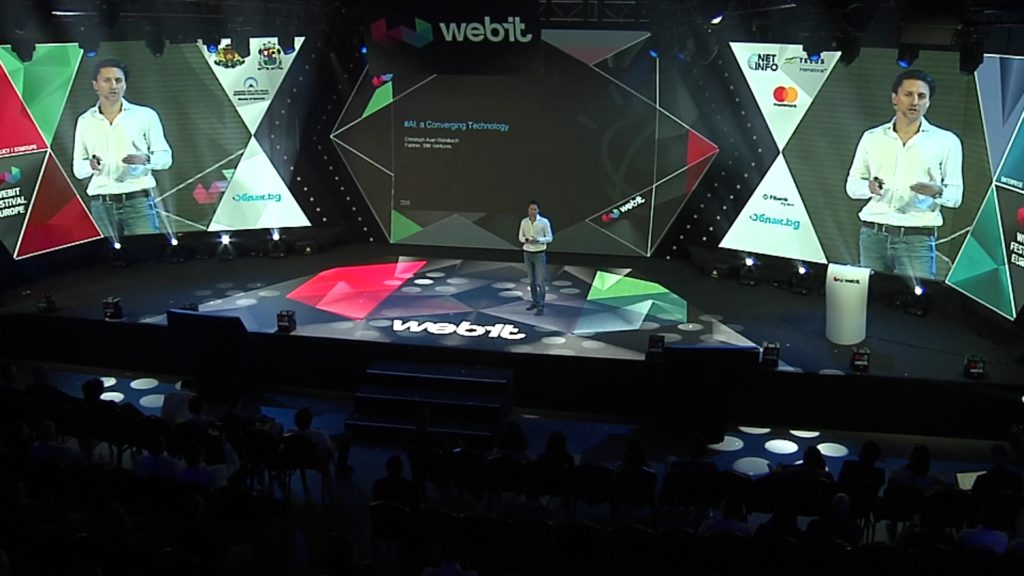 The Partner at IBM Ventures Christoph Auer-Welsbach.[/caption]
Christoph Auer-Welsbach predicts that there are 3 paradigms that are going to shape our communication with AI enabled computers in the near future.
The first is that enterprise applications and all the major IT organizations in the world will make use of any kind of conversation methodology, bot or automating systems, in the next couple of years. So our whole way of interacting with machines is going to change from input-driven to engagement and conversation-driven.
The second paradigm AI is pushing is mass individualization. Now we are living in a world where applications and solutions are built to satisfy the most common and homogenous group of people and reach them. The mass standardization we can see now is changing to mass personalization in a way that not only from a customer service view, but also from a product development and engagement point of view machines will be very much personalized on a person’s behavior, demand and attitude.
The third is that we are moving to the world of AI-enabled Convergence. It enables other technologies to flourish and get into the system contextual information and act proactively and not from a passive response point of view.
Artificial Intelligence is still in its infancy. That is why we need to be active and have the curiosity to understand what it is. It is important for every person on Earth to check the latest trends in this technology and understand how it could impact our personal and business life.
The Partner at IBM Ventures Christoph Auer-Welsbach.[/caption]
Christoph Auer-Welsbach predicts that there are 3 paradigms that are going to shape our communication with AI enabled computers in the near future.
The first is that enterprise applications and all the major IT organizations in the world will make use of any kind of conversation methodology, bot or automating systems, in the next couple of years. So our whole way of interacting with machines is going to change from input-driven to engagement and conversation-driven.
The second paradigm AI is pushing is mass individualization. Now we are living in a world where applications and solutions are built to satisfy the most common and homogenous group of people and reach them. The mass standardization we can see now is changing to mass personalization in a way that not only from a customer service view, but also from a product development and engagement point of view machines will be very much personalized on a person’s behavior, demand and attitude.
The third is that we are moving to the world of AI-enabled Convergence. It enables other technologies to flourish and get into the system contextual information and act proactively and not from a passive response point of view.
Artificial Intelligence is still in its infancy. That is why we need to be active and have the curiosity to understand what it is. It is important for every person on Earth to check the latest trends in this technology and understand how it could impact our personal and business life.
“The symbiosis between humans and machines is the most capable way of making use of technology and moving forward into the future. Because we can enhance each other’s capabilities. On the one hand we have human’s capabilities like compassion, intuition and value judgement and on the other we have the learning, discovery and fact checking that machines excel at”, the expert said.You may watch Christoph Auer-Welsbach’s full lecture here: If you want to keep up with the latest trend in the world of digital economy and technology, then Webit.Festival is the right place for you. Visit our website and book 2 of our Super Earlybird tickets for Webit.Festival Europe 2018 for just €100. Feel the Webit vibe with some of the best photos from this year’s event! [easingslider id="4954"]
Big Data will lead to the biggest transformation in healthcare we...
“We have made a lot of advancements in medical technology. Imagine the advancements we could have made if instead of just a fraction of data, we were able to access the entire lexicon of data that is available for an individual. Think what we could do and think of the price of not knowing”, she said.Now, many patients are not able to get the right cancer treatment, because doctors don’t know the exact characteristics of the individual tumor. People with chronic diseases don’t have access to the right medicine, because their doctors don’t have their full medical history. All of these cases are going to change with the help of Big Data. But first, experts, like the ones working in IBM, must deal with several challenges. There are a lot of bad sources of data out there, so you need to be able to separate the true from false. Doctors have got data from medical records, laboratory data, medical literature, radiology data. So they need to be able to aggregate all those forms of information to get a complete picture of what is going on with an individual. If we combine all these we will start to get to the true value of the data and start to really do things with it in terms of what we are delivering to an individual patient. [caption id="attachment_5068" align="aligncenter" width="640"]
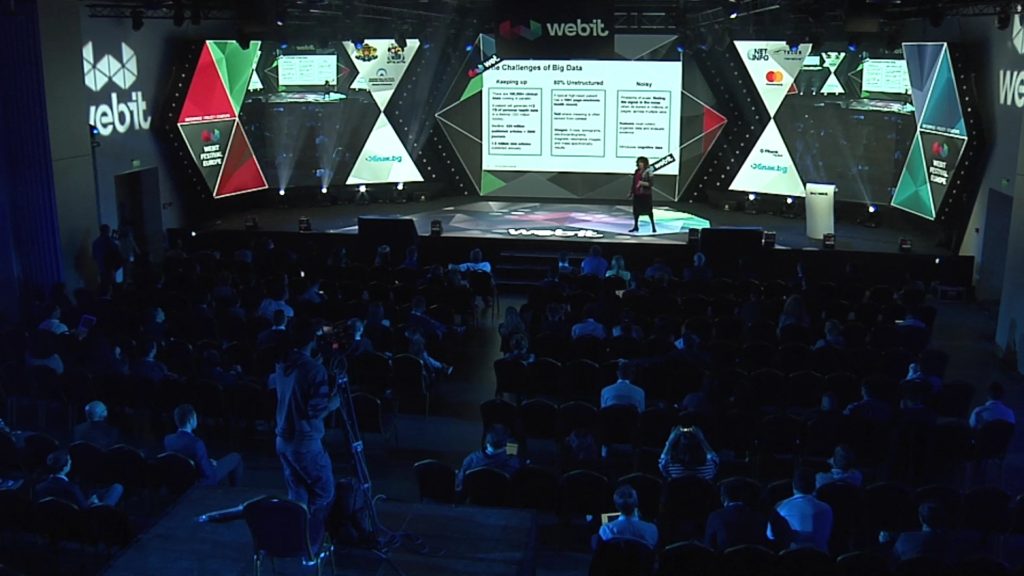 The Deputy Chief Health Officer for IBM Watson Health Dr. Lisa Latts[/caption]
We are now in in the Third age of computer technology. The first age in the early 1900’s was the Tabulating systems era - computers that basically can do math and count. Then in the 1950’s we started with Programmable computers and we are still in that age today where we have computes that we can give a variety of information and tell them what to do with it.
There is so much information available now that it is impossible to program all the characteristics and all the possible programs. So that brings us to the Cognitive computers era. IBM Watson started to work on this in the early 2000’s and 15 years after that was the official launch of Watson Health.
A cognitive computer is different from programmable computer, because it can understand, reason, learn and interact. All of this allows Watson to harness entire bodies of data. It can actually read through the data it is fed to it.
The Deputy Chief Health Officer for IBM Watson Health Dr. Lisa Latts[/caption]
We are now in in the Third age of computer technology. The first age in the early 1900’s was the Tabulating systems era - computers that basically can do math and count. Then in the 1950’s we started with Programmable computers and we are still in that age today where we have computes that we can give a variety of information and tell them what to do with it.
There is so much information available now that it is impossible to program all the characteristics and all the possible programs. So that brings us to the Cognitive computers era. IBM Watson started to work on this in the early 2000’s and 15 years after that was the official launch of Watson Health.
A cognitive computer is different from programmable computer, because it can understand, reason, learn and interact. All of this allows Watson to harness entire bodies of data. It can actually read through the data it is fed to it.
“There is no way that a clinician can keep up with that amount of information, but Watson can. It can read million pages in a second and understand them. It can learn. So it will digest the data and will come up with evidence-based conclusions as a result. Those conclusions may or may not be right, so it takes humans to train Watson in terms of what is right and what is wrong. And it gets better and better over time”, Dr. Latts explained.All this is possible thanks to the Watson Health Platform. It allows IBM to create an ecosystem, which can be used by developers within the company and outside. This has expanded to a network of collaborators and partners creating innovation across the world. Lisa Latts is sure that artificial intelligence will not replace human doctors. Instead, the combination of humans and Watson creates augmented intelligence, that will help them focus on the fields they are better than the machine. It will free up physicians and clinicians for what people and doctors do best - interactive communication. To do their job in the best way possible, physicians need to use interpersonal communication, compassion and to be able to abstract, generalize and dream. Meanwhile, cognitive computer systems are good at taking vast amount of data and come to conclusions. All these factors are used to advance evidence-based care. Traditionally we say that in medicine it takes 17 years for a breakthrough to be translated into clinical best practice. But in the dynamic society we live in, we don’t have the luxury to wait that long any more. Using a Watson-powered solution, clinicians аре quickly armed with evidence-based and ranked treatment options for their consideration. Recommendations based on the patient’s condition and medical evidence are available in approximately 30 seconds. A physician have to read 29 hours each work day to stay up-to-date with the latest medical literature. Watson needs only 3 seconds to read 200 million documents.
“Today we are working on a variety of solutions from cancer care to evidence-based care in a value-based care setting to life science. We, Watson Health, aspire to improve lives and give hope delivering innovation to address the world’s most pressing health challenges through data and cognitive insights”, Latts said.You may watch her full lecture here: If you want to keep up with the latest trend in the world of digital economy and technology, then Webit.Festival is the right place for you. Visit our website and book 2 of our Super Earlybird tickets for Webit.Festival Europe 2018 for just €100. Feel the Webit vibe with some of the best photos from this year’s event! [easingslider id="4954"]
If your company doesn’t like change, it will eventually become irrelevant
“It is important to realize this. If you look at where you are and where you want to be make sure to let go of the past to move on to the future”, the expert said.He reminded that Cloud Computing is actually not a new thing, but we can all give credit to Amazon for making this the number one priority for many companies today. What is important to understand about Cloud Computing is that it is now a must have thing. The Cloud Computing era brought forward a process, called Digital Transformation. A lot of established companies now go through the rapid attempt to digitalize themselves and there is a real race to transform. The other thing that Cloud Computing brought is the lower bar for entry in the space of technology. If we go back 10 or 15 years ago, it required a much bigger minimal investment to try to launch a service. In the ever evolving markets there is a price war and ultimate race to the bottom. As soon as a company comes with a low price, everyone try to chase after. The markets are growing faster than we can actually imagine thanks to trends, such as IoE and AI.
“What that means for all the cloud vendors is that they have to focus on what makes them different. That is the key thing to succeed. It can not all go down to zero in terms of revenue from our services so we have to differentiate”, said Jacobi.The important thing when we look at the things popping out on the market is that they go through some form of evaluation of the market. In the case of connected devices this process is called IoT Chasm and it follows several steps. A new trend comes out and everybody is super excited. We start with the honeymoon period which is like coming to a new place and saying that you are going to stay there forever. Then you start noticing some functions that doesn’t suit you well. But after a while you realize that you are committed to the technology. When a user is already committed, he starts looking not only for convenience, but for things like security of the product. Many IoE companies think of the security as of something that is going to come later. But we are on a stage of development in which someone can hack a car and steer it off the road Once the commitment is a fact, we get into those deeper issues, and as soon as we go through them we get into the major adoption curve of a new technology. [caption id="attachment_5060" align="aligncenter" width="640"]
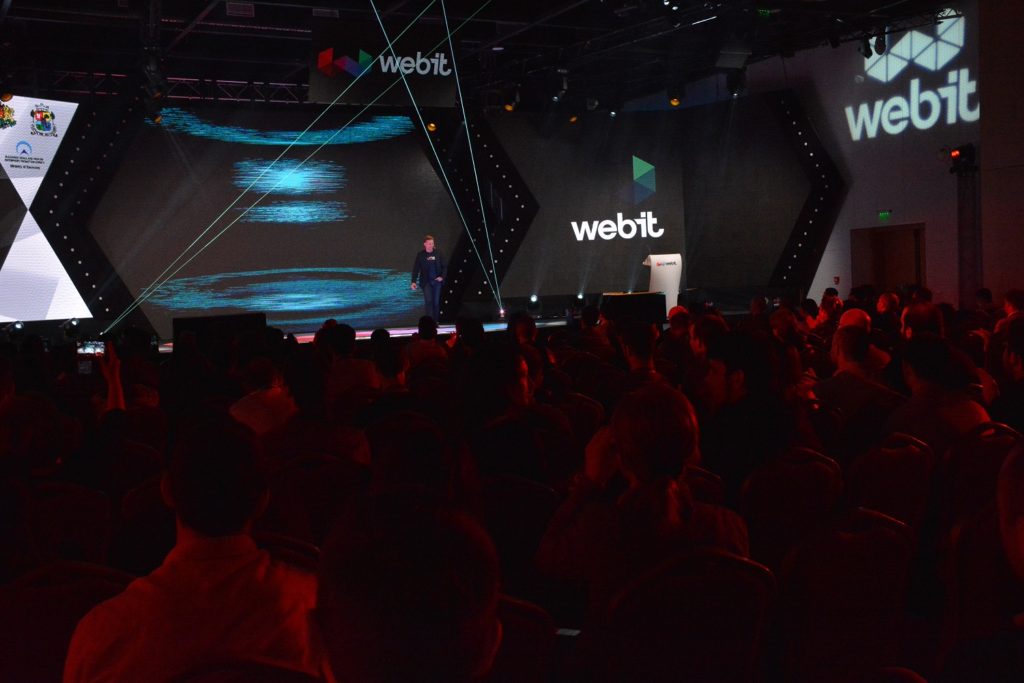 The VP for Cloud and Mobile Technology Strategy at IBM Jonas Jacobi.[/caption]
Connected cars present a giant market opportunity. But now there are even 3D printed self-driving minivans that are with built in AI. We can talk to the bus and communicate with it. We can even ask for a good restaurant and it will take us there. Now technology is not disrupting just one business, but several at the same time.
If you can 3D print a car then you disrupt manufacturing, traffic planning, optimizing traffic fall and making it greener. This is where we are heading. Soon we will just be able to download a blueprint and go print our own personalized car in the shop.
The other giant trend in technology is the rise of Artificial Intelligence. And while many people perceive the adoption of such technology as a start of the battle between the man and machine, the reality is that AI will augment humanity and human intelligence, not replace us.
The VP for Cloud and Mobile Technology Strategy at IBM Jonas Jacobi.[/caption]
Connected cars present a giant market opportunity. But now there are even 3D printed self-driving minivans that are with built in AI. We can talk to the bus and communicate with it. We can even ask for a good restaurant and it will take us there. Now technology is not disrupting just one business, but several at the same time.
If you can 3D print a car then you disrupt manufacturing, traffic planning, optimizing traffic fall and making it greener. This is where we are heading. Soon we will just be able to download a blueprint and go print our own personalized car in the shop.
The other giant trend in technology is the rise of Artificial Intelligence. And while many people perceive the adoption of such technology as a start of the battle between the man and machine, the reality is that AI will augment humanity and human intelligence, not replace us.
“At IBM we are working a lot with AI on healthcare. AI can help doctors reach a decision faster, get access to more information faster and anything else in the market. In this case it is an opportunity to improve and safe life of many”, Jacobi said.He thinks that cognitive systems do not think for us, but help us do research and make better decisions. The IBM expert said that no matter how hard we resist and try to push back change, it will inevitably come to us, so we should instead endorse it and bring it in. Because the sooner we adopt new technology, ideas and business models, the faster we can evolve as companies and individuals. You may watch Jonas Jacobi’s full lecture here: If you want to keep up with the latest trend in the world of digital economy and technology, then Webit.Festival is the right place for you. Visit our website and book 2 of our Super Earlybird tickets for Webit.Festival Europe 2018 for just €100. Feel the Webit vibe with some of the best photos from this year’s event! [easingslider id="4954"]
IBM stored information in an atom. What that means for BigData...
Webit.Foundation presents the first three speakers in the Tech Summit of...
One of the main pillars of Webit.Festival, the Tech Summit and its Digital Transformation track, are once again bringing together the top CIOs, CTOs and other executives from the enterprise along with the hottest founders of startups, innovators and government key figures. During the 25th and the 26th of April, Webit.Festival 2017 is the place to be in Europe if you want to hear about the latest innovations in the world, the many ways you can digitally transform your business to remain competitive or just to learn more from the leading execs of Fortune Top 500 companies.
We have 3 new top-flight speakers in our lineup for the Tech Summit! They include a real flying man and innovator, the founder of an unicorn company, who recently sold his business for over 1 billion dollars and serial investor with huge experience, so read our guide to taking part or find out more about our latest speaker additions below.
- Jonas Jacobi, Vice President, Cloud and Mobile Technology Strategy IBM.
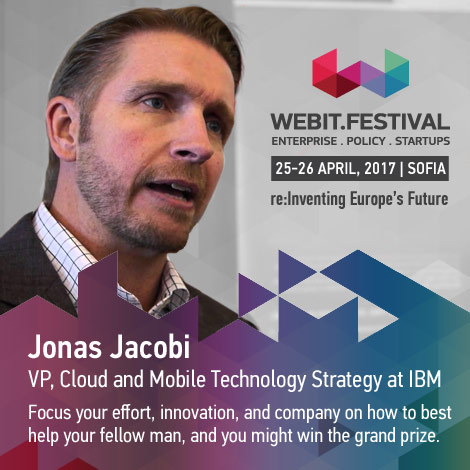 cobi is responsible for IBM’s enduring strategy according to everyday tech innovations, startups and enterprise policies. Prior to working at IBM, he has been part of Oracle’s and Brane Corporation’s teams; he still advises IoT Expo International Conference Series; has founded and co-founded several tech companies as well as his own consulting company. With his co-founded company Kaazing Corporation he has participated in rewriting the way Web and and Mobile applications are being designed. He is also the author of the book “Pro JSF and Ajax : Building Rich Internet Components” and writes articles for top rank tech magazines such as Wired, Bob’s Guide, JavaPro, Java Developer's Journal, AjaxWorld, and Oracle Magazine on a regular basis. Speeches at international tech events or TV interviews are also an essential part of his professional life. Mr. Jacobi has been awarded with “Business Excellence Award - Commitment to Innovation” in 2013. Outside of the IBM office, his deep interest in IoT, tech, Web and Mobile visualizes in advising entrepreneurs and startups.
cobi is responsible for IBM’s enduring strategy according to everyday tech innovations, startups and enterprise policies. Prior to working at IBM, he has been part of Oracle’s and Brane Corporation’s teams; he still advises IoT Expo International Conference Series; has founded and co-founded several tech companies as well as his own consulting company. With his co-founded company Kaazing Corporation he has participated in rewriting the way Web and and Mobile applications are being designed. He is also the author of the book “Pro JSF and Ajax : Building Rich Internet Components” and writes articles for top rank tech magazines such as Wired, Bob’s Guide, JavaPro, Java Developer's Journal, AjaxWorld, and Oracle Magazine on a regular basis. Speeches at international tech events or TV interviews are also an essential part of his professional life. Mr. Jacobi has been awarded with “Business Excellence Award - Commitment to Innovation” in 2013. Outside of the IBM office, his deep interest in IoT, tech, Web and Mobile visualizes in advising entrepreneurs and startups.
- David Mayman, CEO, JetPack Aviation.
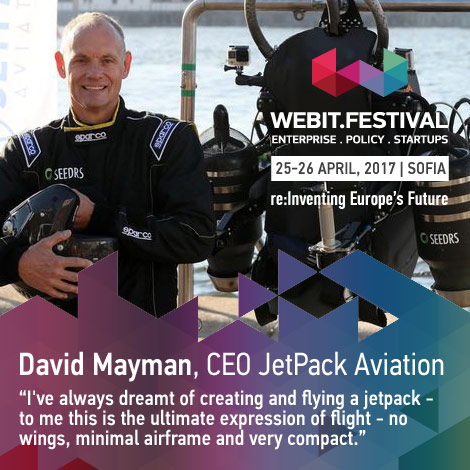 Mr. Mayman is a professional pilot and creator of “The World’s First True Jetpack”.He is one of those people who inspire not only with their professional path, but also with their not-afraid-to-live-elsewhere braveness too. During his years of professional development he had combined commerce, aviation, mineral exploration, digital media and technologies and have lived in 5 of all the 7 continents on Earth: Europe, Africa, Asia, North America and Australia. But his true passion has always been aviation. Mr. Mayman is a passionate pilot since his teenage years. He earned Australian private aeroplane pilots licence, commercial licence valid in America and private European licence for both helicopters and aeroplanes. Now, after 25 years dedication in total, he has discovered the ultimate freedom feeling by flying only armed with jetpack on back. “No wings, minimal airframe and very compact” by his own words, so far flights have been executed in Monaco, New York and London. Mr. Mayman is currently interested in disruptive technology companies, startups, early stage investments, and, of course, future development of JetPack so that it becomes affordable to everyone some future day.
Mr. Mayman is a professional pilot and creator of “The World’s First True Jetpack”.He is one of those people who inspire not only with their professional path, but also with their not-afraid-to-live-elsewhere braveness too. During his years of professional development he had combined commerce, aviation, mineral exploration, digital media and technologies and have lived in 5 of all the 7 continents on Earth: Europe, Africa, Asia, North America and Australia. But his true passion has always been aviation. Mr. Mayman is a passionate pilot since his teenage years. He earned Australian private aeroplane pilots licence, commercial licence valid in America and private European licence for both helicopters and aeroplanes. Now, after 25 years dedication in total, he has discovered the ultimate freedom feeling by flying only armed with jetpack on back. “No wings, minimal airframe and very compact” by his own words, so far flights have been executed in Monaco, New York and London. Mr. Mayman is currently interested in disruptive technology companies, startups, early stage investments, and, of course, future development of JetPack so that it becomes affordable to everyone some future day.
- Gareth Williams, CEO and Co-Founder, Skyscanner.
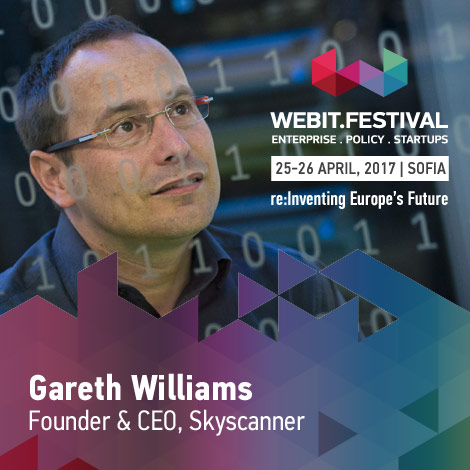 Mr. Williams’ business aim of “Making travel search as easy as possible” appears to be one of the turnkeys in today’s flight booking world. He co-founded the widely known website Skyscanner 15 years ago and helps thus 50 million users on average to find the best travelling deals. Former software trainer and developer, his Curriculum Vitae includes work at Pygmalion, Nations Bank, Marks & Spencer. In December 2014, he won the Travolution Achievement Award, which is awarded by a small jury, according to the professional’s achievements and impact on the travel landscape. Apart from travelling and coding, Mr. Williams is a passionate ski and chess player, as well as a keen fan of sculpting and drawing. Going back to travelling, Mr. Williams prefers to land on different places each time.
The main topics of the summit are the digital transformation of all industries, the emerging Internet of things, which includes connected cars, smart homes, wearables and many more, cyber security and privacy, fintech, money and payments.
Previous speakers at the Tech Summit and the Digital Transformation track are top level executives and innovators like Jessica Federer, Chief Digital Officer of Bayer, John Dillon, VP Marketing of Akamai Technologies, Dr Torsten Wingerten, Head of Digital Innovations, Lufthansa, Damien Blackden, WW Chief Strategy Officer, Maxus, Rohit Tripathi, GM and Head of Products, SAP Mobile Services, Andrew NG, Chief Scientist of Baidu.
The Tech Summit is also great for networking – the next business opportunity could be waiting for you right there. Listening to the great presentators, you can also learn a lot about the way you’re a running your business how you can digitally transform it.
So, don’t waste your time, these are all the important links you need:
To buy your tickets for Webit.Festival Europe 2017 (EarlyBird expires soon), click here.
To apply for speaking, click here.
To apply for partnership, click here.
To apply for exhibiting, click here.
StartUP? Apply for the Founders Games Challenge by Webit.Foundation and get an opportunity for free festival tickets (500), free exhibition table (100) and opportunity to win 200 000 EUR (only 1), click here.
To see the video gallery from Webit.Festival 2016, click here.
To learn more about the events that are part of the festival, click here.
To see pictures from our previous events, click here.
For more information on the Global Webit Series and our events in Dubai, Singapore, New Delhi and Istanbul: www.Webit.Org.
Mr. Williams’ business aim of “Making travel search as easy as possible” appears to be one of the turnkeys in today’s flight booking world. He co-founded the widely known website Skyscanner 15 years ago and helps thus 50 million users on average to find the best travelling deals. Former software trainer and developer, his Curriculum Vitae includes work at Pygmalion, Nations Bank, Marks & Spencer. In December 2014, he won the Travolution Achievement Award, which is awarded by a small jury, according to the professional’s achievements and impact on the travel landscape. Apart from travelling and coding, Mr. Williams is a passionate ski and chess player, as well as a keen fan of sculpting and drawing. Going back to travelling, Mr. Williams prefers to land on different places each time.
The main topics of the summit are the digital transformation of all industries, the emerging Internet of things, which includes connected cars, smart homes, wearables and many more, cyber security and privacy, fintech, money and payments.
Previous speakers at the Tech Summit and the Digital Transformation track are top level executives and innovators like Jessica Federer, Chief Digital Officer of Bayer, John Dillon, VP Marketing of Akamai Technologies, Dr Torsten Wingerten, Head of Digital Innovations, Lufthansa, Damien Blackden, WW Chief Strategy Officer, Maxus, Rohit Tripathi, GM and Head of Products, SAP Mobile Services, Andrew NG, Chief Scientist of Baidu.
The Tech Summit is also great for networking – the next business opportunity could be waiting for you right there. Listening to the great presentators, you can also learn a lot about the way you’re a running your business how you can digitally transform it.
So, don’t waste your time, these are all the important links you need:
To buy your tickets for Webit.Festival Europe 2017 (EarlyBird expires soon), click here.
To apply for speaking, click here.
To apply for partnership, click here.
To apply for exhibiting, click here.
StartUP? Apply for the Founders Games Challenge by Webit.Foundation and get an opportunity for free festival tickets (500), free exhibition table (100) and opportunity to win 200 000 EUR (only 1), click here.
To see the video gallery from Webit.Festival 2016, click here.
To learn more about the events that are part of the festival, click here.
To see pictures from our previous events, click here.
For more information on the Global Webit Series and our events in Dubai, Singapore, New Delhi and Istanbul: www.Webit.Org. IoH in IoT: Jonas Jacobi, Vice President, Cloud and Mobile Technology...
aniela@webitcongress.com
10 reasons to join Webit Global Congress
- The only place with almost 60% C-level attendees who you can join to connect with the world’s Digital, Tech and Media elite! C-level managers at companies like Facebook, Apple, Google, etc. Pay attention – active managers (not ex-ones).
- The venue – not only because of the fabulous city of Istanbul, but also because of the impressive venue which can be reached by all means of transport, including by boat.
- Networking party on yacht – why not?
- You will be surrounded by `giants` - Google, IBM, Apple, eBay. Good feeling, isn’t it?
- Lectures will be divided in two flows – digital marketing and entrepreneurship. You can focus on what is really important to you and your business.
- Speakers have only 10 minutes for their lectures – no babbling, only the essential.
- Along the whole event, topics, devoted to new growing markets, will be discussed. Markets in Africa, Middle East, East Europe, etc. which will define the new trends and on which you want to operate, for sure. This way you can be sure you will not waste neither your time, nor your money.
- Great opportunity for networking with worldwide known experts. Please, read again reason №4.
- The only event where you will meet the best agencies in the world – Agency Lounge will be the place where agencies meet their clients and talk "Successful Business".
- Founder Games, organised by Webit, are looking for the best startups and provide 1 million EUR marketing budget for startups.
